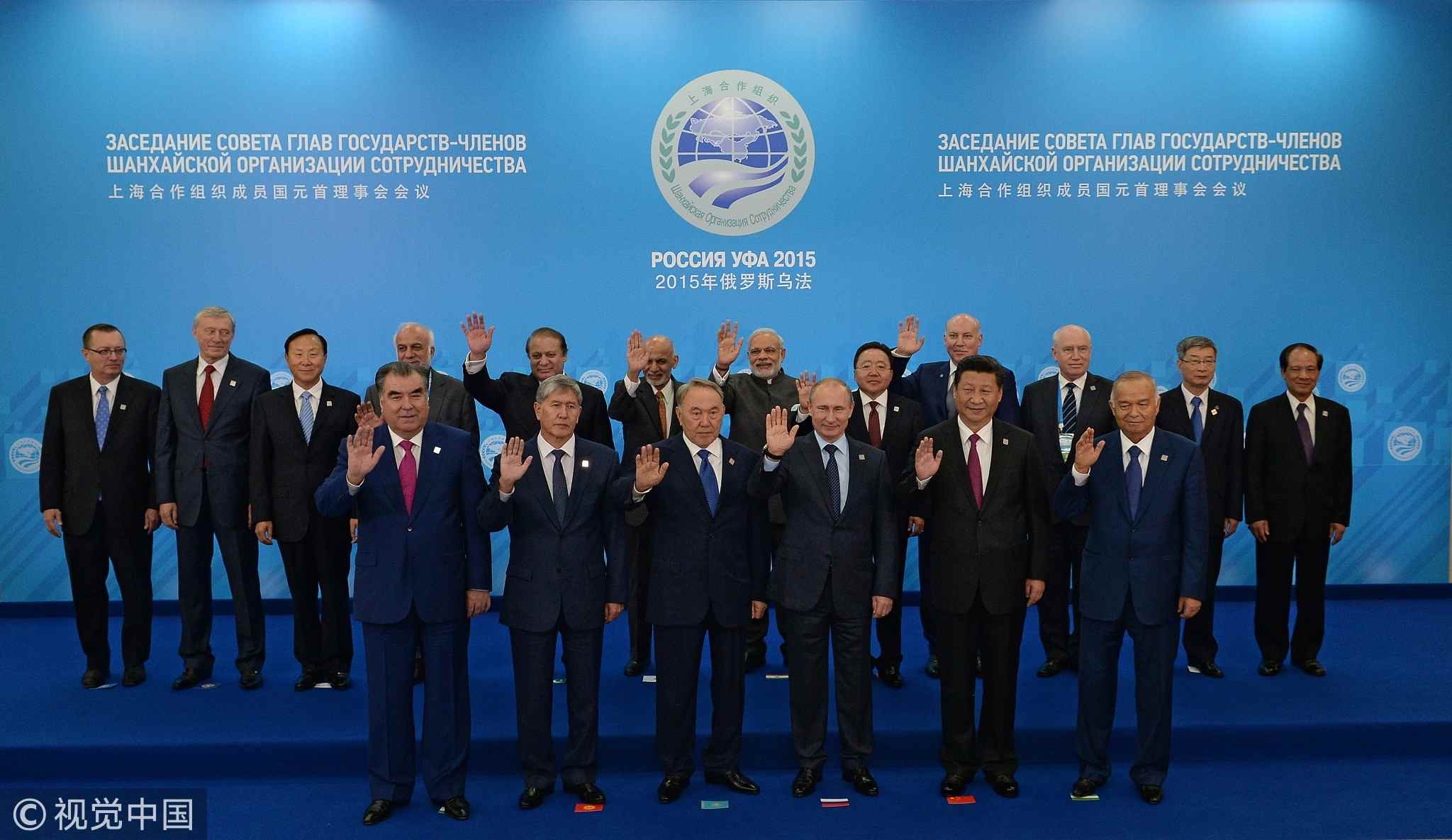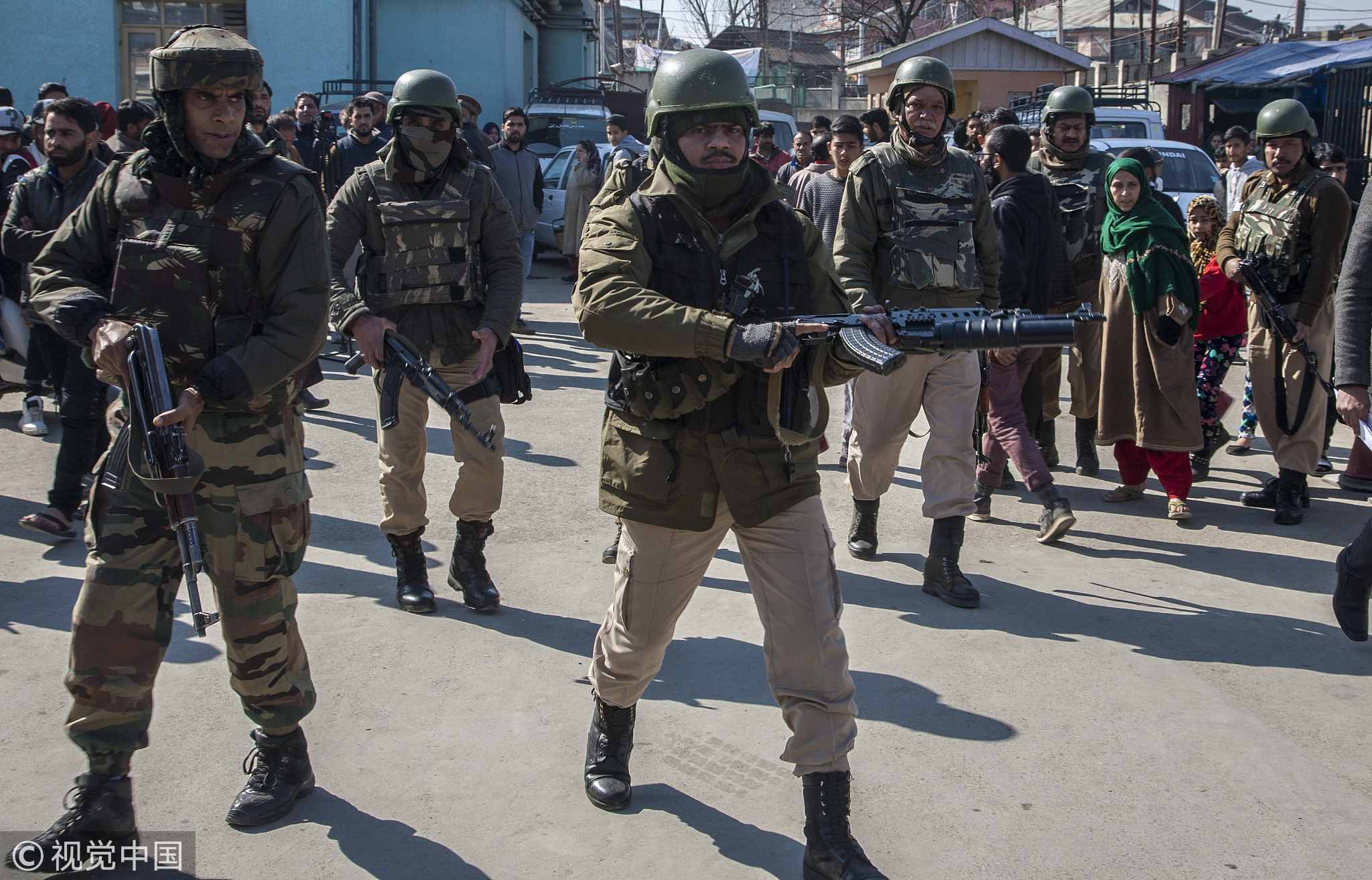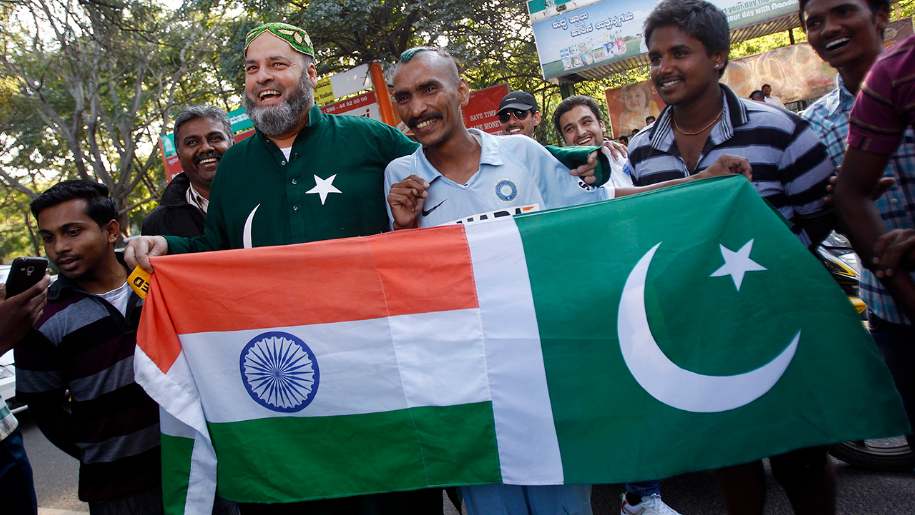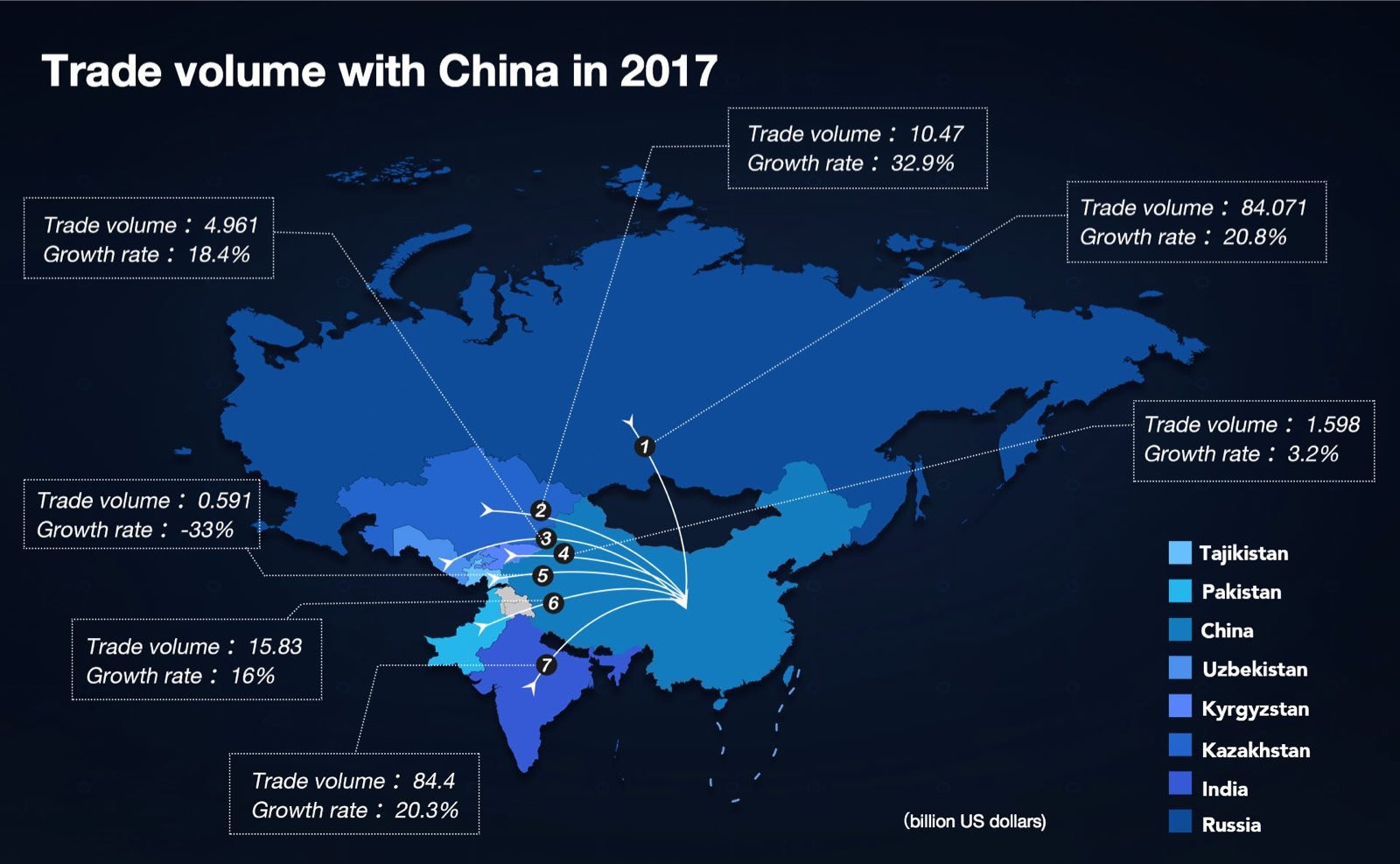India and Pakistan completed the process of joining the Shanghai Cooperation Organization (SCO) on June 9, 2017, at the summit in Astana, Kazakhstan.
It marked the first membership expansion of the SCO since its founding in 2001.
India and Pakistan were previously admitted as observers in 2005.
At the 2015 summit in Ufa, Russia, the decision to admit the two Asian neighbors was announced. The process was completed in two years.

Heads of State and Government and observers during the Shanghai Cooperation Organization (SCO) summit in Ufa on July 10, 2015. /VCG Photo
Heads of State and Government and observers during the Shanghai Cooperation Organization (SCO) summit in Ufa on July 10, 2015. /VCG Photo
This weekend's SCO summit in eastern China's Qingdao City is the first of its kind since the expansion. The full members are China, Kazakhstan, Kyrgyzstan, Russia, Tajikistan, Uzbekistan, India and Pakistan.
What benefits can expansion bring?
The expansion of the SCO infuses vigor into organization's future development, boosts its international reputation, enhances regional security and realizes economic integration.
Granting India and Pakistan membership will boost the organization's development and potential, said an SCO joint press communique released after the summit in Astana.
With Pakistan and India’s formal induction, the group now represents 40 percent of the world’s population and almost 20 percent of its GDP.
Meanwhile, expansion will result in far-reaching influence on the international agenda, vigorously boost international security and stability and help resolve problems in the Eurasian region, Dmitry Mezentsev, former secretary general of the SCO, said.

SCO Secretary General Rashid Alimov, Uzbekistan's Foreign Minister Abdulaziz Kamilov, Tajikistan's Foreign Minister Sirodjidin Aslov, Russia's Foreign Minister Sergei Lavrov, China's Foreign Minister Wang Yi, Pakistan's Foreign Minister Khawaja Muhammad Asif, Kyrgyzstan's Foreign Minister Erlan Abdyldaev, Kazakhstan's Foreign Minister Kairat Abdrakhmanov, India's Foreign Minister Sushma Swaraj, and SCO Regional Anti-Terrorist Structure Director Yevgeny Sysoyev (L-R) pose for a group photo ahead of a meeting of foreign ministers of the Shanghai Cooperation Organization (SCO) member states on April 24, 2018. /VCG Photo
SCO Secretary General Rashid Alimov, Uzbekistan's Foreign Minister Abdulaziz Kamilov, Tajikistan's Foreign Minister Sirodjidin Aslov, Russia's Foreign Minister Sergei Lavrov, China's Foreign Minister Wang Yi, Pakistan's Foreign Minister Khawaja Muhammad Asif, Kyrgyzstan's Foreign Minister Erlan Abdyldaev, Kazakhstan's Foreign Minister Kairat Abdrakhmanov, India's Foreign Minister Sushma Swaraj, and SCO Regional Anti-Terrorist Structure Director Yevgeny Sysoyev (L-R) pose for a group photo ahead of a meeting of foreign ministers of the Shanghai Cooperation Organization (SCO) member states on April 24, 2018. /VCG Photo
Xinhua noted the addition of India, the world’s third-largest economy, confers a new level of international legitimacy on the organization, while Pakistan, as a hub of regional and global terrorism, is a crucial partner to the SCO in stemming the tide of extremism throughout the world.
Additionally, New Delhi and Islamabad's SCO membership will contribute to the SCO's Regional Anti-Terrorist Structure (RATS), said Rizwan Zeb, a CACI analyst.
Both India and Pakistan have already shown up in this year's Fanfare for Peace Military Tattoo and will join SCO's multinational counter-terror exercise in Russia in September. These measures are expected to further enhance defense coordination, internal solidarity, and integration of the group so as to safeguard regional security.
Security and stability are the basis of economic cooperation among SCO member states, agreed Jiang Yi, a researcher with the Institute of Russian, Eastern European, Central Asian Studies at the Chinese Academy of Social Sciences. He added that SCO expansion would help the alignment of China's Belt and Road Initiative with the development strategies of other SCO member states.
How can India and Pakistan benefit from SCO
Experts argued that joining the SCO could facilitate the two countries' trade with the region, address an energy' shortage crisis and increase their impact in the region. Thus, the SCO could also serve as a neutral arena for New Delhi and Islamabad to discuss their border disputes and other issues of mutual interest.
EastWest Institute scholar Najam Abbas is of the view that membership "would enhance Pakistan’s stature in diplomatic ranking in the region."
For India, notes former Indian ambassador Phunchok Stobdan, joining the SCO "is about increasing (India’s) stakes in Central Asia."

India's Prime Minister Narendra Modi (pictured right) shaking hands with then Pakistan Prime Minister Nawaz Sharif during Shanghai Cooperation Organization (SCO) summit in Ufa on July 10, 2015. /VCG Photo
India's Prime Minister Narendra Modi (pictured right) shaking hands with then Pakistan Prime Minister Nawaz Sharif during Shanghai Cooperation Organization (SCO) summit in Ufa on July 10, 2015. /VCG Photo
• Trade and energy
Both India and Pakistan lack flourishing trade relationships with Central Asian states and are suffering from the energy-hungry crisis.
In 2013, India’s trade with Central Asian countries was as low as 500 million US dollars and it has to either trade with Central Asia through China or through Europe via Russia. India could look to use the SCO for exploring an alternative route to the Central Asian Region CAR.
Islamabad’s trade and economic relations with most SCO members, aside from China, are minimal. The SCO membership will provide Islamabad with an opportunity to initiate and revive a number of projects using the platform of the organization.
Besides, the CAR supplies around 10 percent of oil and energy to the world. SCO membership provides the two countries with an avenue to explore opportunities for importing oil and gas from the Central Asian states, primarily Uzbekistan, Tajikistan, and Kazakhstan.
Read more:
India’s pending energy projects like the TAPI (Turkmenistan-Afghanistan-Pakistan-India) pipeline, IPI (Iran-Pakistan-India) pipeline, and CASA (Central Asia-South Asia)-1000 electricity transmission projects – all of which are blocked, due in part to Pakistan’s approach – can get a much-needed push through the SCO.
• Security
In the sphere of security, the emergence of terrorist organizations like ISIL and the future of Afghanistan are issues that impede positive development across the CAR. Through SCO platform, especially in the defense sector, member countries can develop a joint strategy to address these issues.
The SCO formed Regional Anti-Terrorist Structures (RATS) in 2005 at Tashkent. RATS work on information sharing and joint counterterrorism measures between member states. The SCO has successfully nullified 600 would-be attacks and extradited more than 500 terrorists through the RATS mechanism.
When attending the 16th Meeting of Council of CIO, India's External Affairs Minister Sushma Swaraj noted India through RATS can improve its counterterrorism experience by working toward intelligence sharing, law enforcement, developing best practices and technologies, mutual legal assistance, extradition arrangements and capacity building amongst other measures.
• Dialogue platform for India, Pakistan
The SCO "might be able to play a facilitating role in dealing with the Kashmir dispute with India," argues Abbas.

Indian government forces stand outside a hospital after a Pakistani militant killed two Indian policemen and escaped from the scene on February 6, 2018, in Srinagar, the summer capital of Indian administered Kashmir. /VCG Photo
Indian government forces stand outside a hospital after a Pakistani militant killed two Indian policemen and escaped from the scene on February 6, 2018, in Srinagar, the summer capital of Indian administered Kashmir. /VCG Photo
Alexander Lukin, director of the Center for East Asian and SCO Studies at the Moscow State Institute of International Relations of the Russian Ministry of Foreign Affairs, also agreed the SCO "will provide a new and important platform for India-Pakistan dialogue."
Having successfully helped China, Russia, and the Central Asian republics ink agreements regarding deployment of their conventional forces on borders, the SCO could become an ideal confidence-building mechanism, he added.
Lukin said working together toward the same objectives on the same platform helps in removing mistrust and promotes dialogue on diverse matters.
Dwelling on the implications, Indian diplomat Phunchok Stobdan said, “The initiative will certainly bring greater confidence in the military-to-military interface."
Notably, September's SCO military drill will be the first time since their independence that India and Pakistan will both be jointly part of a military exercise, though the armies of the two nations have worked together in UN peacekeeping missions.
Challenges and prospects
Although the SCO could serve as a platform for India and Pakistan, as Global Times pointed out, their long-existing disputes over territory and religion could disturb the SCO's efforts to carry out the principle of consultation-based consensus.

The 18th SCO Summit is scheduled for June 9-10 in Qingdao, eastern China's Shandong Province. /VCG Photo
The 18th SCO Summit is scheduled for June 9-10 in Qingdao, eastern China's Shandong Province. /VCG Photo
Meanwhile, some worried the SCO mechanism could be affected as the current working languages of the SCO are Chinese and Russian and there has already been a massive language workload in current meeting mechanisms. India's and Pakistan's entry means the organization's daily work is likely to increase exponentially.
In this case, the SCO Qingdao Summit has turned the focus on carting on the "Shanghai Spirit," aiming to enhance trust and solidarity between member states so as to cope with challenges ahead and push them toward shared future.








